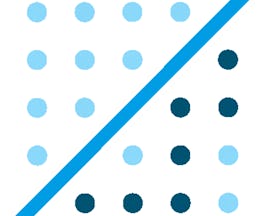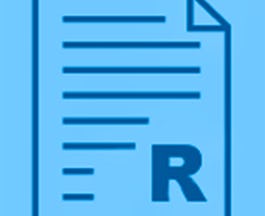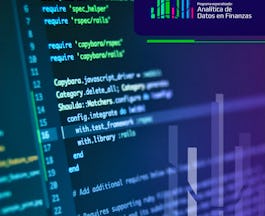Filter by
The language used throughout the course, in both instruction and assessments.
Explore the Regression Course Catalog


Sungkyunkwan University
Skills you'll gain: Machine Learning Algorithms, Decision Tree Learning, Classification And Regression Tree (CART), Unsupervised Learning, Machine Learning, Supervised Learning, Python Programming, Algorithms, Bayesian Statistics, Probability
 Status: Free
Status: Free
Erasmus University Rotterdam
Skills you'll gain: Correlation Analysis, Data Analysis, Statistical Reporting, Quantitative Research, Statistical Analysis, Qualitative Research, R Programming, Sampling (Statistics), Research Methodologies, Scatter Plots

Skills you'll gain: Descriptive Statistics, Statistical Hypothesis Testing, Correlation Analysis, Tidyverse (R Package), Data Analysis, Regression Analysis, Probability & Statistics, Data Import/Export, Statistical Analysis, R Programming, Exploratory Data Analysis, Data Wrangling


University of London
Skills you'll gain: Correlation Analysis, Predictive Modeling, Data Collection, Regression Analysis, Data Science, Forecasting, Data Analysis, Statistical Modeling, Time Series Analysis and Forecasting, Data-Driven Decision-Making, Exploratory Data Analysis, Feature Engineering

Skills you'll gain: Splunk, Data Modeling, Role-Based Access Control (RBAC), System Monitoring, Incident Response, User Accounts, Security Information and Event Management (SIEM), Authorization (Computing), Machine Learning, Event Monitoring, Systems Administration, Performance Tuning, Data Visualization, Threat Detection, Identity and Access Management, Exploratory Data Analysis, Anomaly Detection, Continuous Monitoring, Correlation Analysis, Data Analysis


Universidad de los Andes
Skills you'll gain: Technical Analysis, Financial Trading, Financial Market, Performance Measurement, Capital Markets, Market Trend, Investments, Market Data, Return On Investment, Statistical Machine Learning, Financial Analysis, Machine Learning, Classification And Regression Tree (CART), Trend Analysis

Skills you'll gain: Feature Engineering, Bioinformatics, Dimensionality Reduction, Predictive Modeling, Deep Learning, Artificial Neural Networks, Pandas (Python Package), Verification And Validation, Unsupervised Learning, Jupyter, Python Programming, Regression Analysis, Machine Learning Algorithms, Exploratory Data Analysis, Machine Learning, Data Analysis

Skills you'll gain: Matplotlib, Pandas (Python Package), Data Visualization, NumPy, Linear Algebra, Deep Learning, Natural Language Processing, Data Manipulation, Machine Learning Algorithms, Machine Learning, Python Programming, Supervised Learning, Data Processing, Artificial Neural Networks, Data Structures, Regression Analysis


Whizlabs
Skills you'll gain: Machine Learning Algorithms, Image Analysis, Reinforcement Learning, Forecasting, Algorithms, AWS SageMaker, Artificial Intelligence and Machine Learning (AI/ML), Machine Learning, Time Series Analysis and Forecasting, Supervised Learning, Unsupervised Learning, Predictive Analytics, Regression Analysis, Natural Language Processing, Classification And Regression Tree (CART)


University of Colorado Boulder
Skills you'll gain: Supervised Learning, Data Science, Artificial Neural Networks, Dimensionality Reduction, Unsupervised Learning, Classification And Regression Tree (CART), Decision Tree Learning, Machine Learning, Predictive Modeling, Feature Engineering, Random Forest Algorithm, Performance Tuning


Johns Hopkins University
Skills you'll gain: Network Analysis, R Programming, Statistical Analysis, Regression Analysis, Statistical Modeling, Combinatorics, Bayesian Network, Statistical Hypothesis Testing, Data Analysis, Probability, Statistics, Applied Machine Learning, Probability & Statistics, Statistical Methods, Probability Distribution, Simulations, Data Science, Markov Model, Applied Mathematics, Mathematical Modeling
 Status: Free
Status: Free
Coursera Project Network
Skills you'll gain: Analytics, R Programming, Scripting, Google Sheets, Applied Machine Learning, MLOps (Machine Learning Operations), CI/CD, Predictive Modeling, Automation, Data Manipulation, GitHub, Gmail
In summary, here are 10 of our most popular regression courses
- Machine Learning Algorithms: Sungkyunkwan University
- Necessary Condition Analysis (NCA): Erasmus University Rotterdam
- Data Analysis in R with RStudio & Tidyverse: Codio
- Data Science Project Capstone: Predicting Bicycle Rental: University of London
- Splunk Administration and Advanced Topics: EDUCBA
- Algoritmos de negociación basados en machine learning: Universidad de los Andes
- Capstone Project: Advanced AI for Drug Discovery: LearnQuest
- Prerequisites and Advanced Machine Learning for NLP: Packt
- ML Algorithms: Whizlabs
- Trees, SVM and Unsupervised Learning: University of Colorado Boulder













